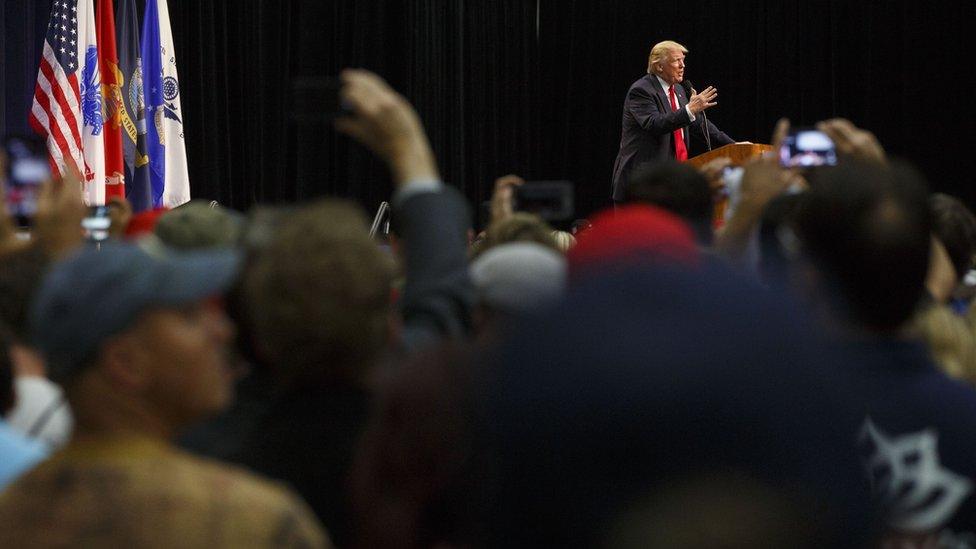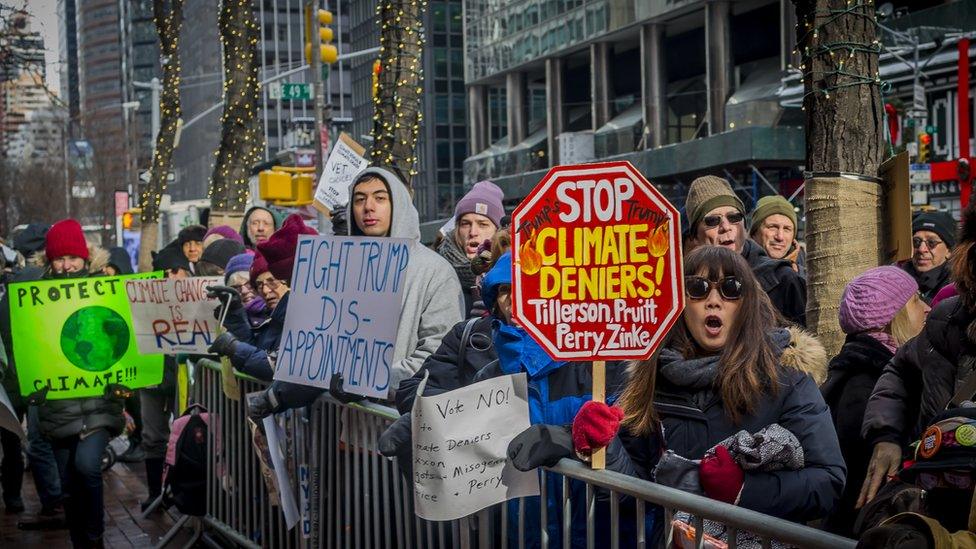Trump team moving away from supporters on climate science
- Published

Trump's cabinet nominees appear to accept far more climate science than his grassroots supporters
Donald Trump and his cabinet accept far more of the research on climate change than many of their political supporters, say British scientists.
UK researchers say Mr Trump's team acknowledge key concepts such as the relationship between fossil fuels and rising temperatures.
They are among a group of 100 scientists urging the Prime Minister to push the President-elect on climate.
Mr Trump has previously pledged to pull the US out of the Paris climate deal.
Evolving position
Throughout the presidential election campaign, Donald Trump made clear that the Paris agreement was "bad for US business".
He said the pact allows "foreign bureaucrats control over how much energy we use".
Since winning the White House, Mr Trump has moderated his view somewhat, saying he now has an "open mind" on US involvement in the pact.
Many environmentalists have railed against his nominations for key posts, accusing them of denying or minimising climate science. These include Scott Pruitt as head of the Environmental Protection Agency (EPA) and former Exxon Mobil CEO Rex Tillerson as Secretary of State.
Speaking to the media, UK climate experts said there were reasons for hope that the pro-active climate change agenda adopted by President Obama would survive under President Trump.
"It is clear that they actually accept a great deal more of the science of human influence on climate than they are prepared to let on," said Prof Myles Allen from the University of Oxford.
"They are acknowledging there is a link, there is a potential problem and that's already more than enough to justify continuing the relatively modest goals of both the Paris agreement and Clean Power Plan."
At odds with the base
Prof Allen believes that the statements of the transition team to date are far removed from the views expressed by their grassroots supporters.
"We're in a situation where the foot soldiers of denial are well behind their generals," he told reporters.

Environmental campaigners have taken to the streets to oppose some of Trump's cabinet nominations
"If the blue collar voter that Trump is so concerned about is to change their position to support climate action they are going to have to understand that it isn't a Chinese hoax plot, and they are going to have to understand that even the people they vote for don't believe that either."
Prof Allen was among a group of 100 academics who have written to the Prime Minister asking that she push Mr Trump to accept climate science and the global deal that was negotiated in Paris at the end of 2015.
"We urge you, as Prime Minister, to use the United Kingdom's special relationship with the United States, as well as international fora such as the G7 and G20, to press President-Elect Trump and his administration to acknowledge the scientific evidence about the risks of climate change, to continue to support international action to counter climate change, including the Paris Agreement, and to maintain support for world class research and data-gathering on climate change in the United States," the letter states.

Trump promised that he would "cancel" the Paris agreement while campaigning for office
Other signatories are hopeful that the new President's practical approach may yet ensure that climate friendly policies are enacted.
"Trump is not as idealistic as several climate deniers are. He has changed his mind on several topics so far," said Prof Corinne Le Quere from the University of East Anglia.
"He has said he is going to invest in infrastructure, he hasn't said what exactly he is going to do.
"My feeling is that he is actually more influence-able than we think, I would hate to see him pushed in a corner and I would want to see sectors of society trying to influence and push him in the direction where he actually takes the risks of climate change seriously."
British researchers believe that the anti-climate science stance of populist movements around the world shows that scientists must urgently change their own message to appeal to a broader audience.
"For too long the climate change discussion has been about things that will happen in 100 years time," said Prof Allen.
"For economically insecure people, statements about what might happen in 100 years time they just don't care about, because they know these kind of predictions have been proved wrong in the past and will be in the future."
"Better science is not the crucial thing here. It's this realisation that the people primarily being affected by climate change are the poor and the people benefitting are the extremely wealthy."
Follow Matt on Twitter, external and on Facebook, external